The Ultimate List of the 14 Best Japanese Gardening Tool Brands

Jump to:
Japanese companies produce some of the most popular gardening tools in the world. From pruning saws, to shears, to hatchets, any list of the top gardening tools typically includes a couple of Japanese brands.
What makes Japanese gardening tool brands so special is their attention to detail, their usage of quality materials like Japanese steel and iron, and their innovations. If you’re looking for your next favorite brand to upgrade your garden shed, consider some of the companies listed below.
ARS Corporation
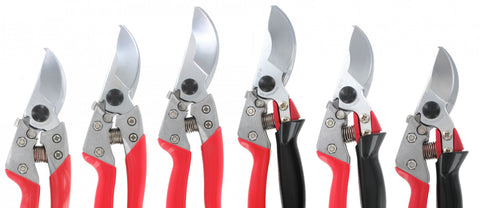
In their 150 years of business, ARS Corporation has gone from strength to strength, taking them from a small workshop in Sakai, to one of Japan's largest gardening tool brands, stocked in home and garden centers nationwide.
ARS' history is a history of firsts, from producing the first chrome-plated shears in Japan, to being one of the first Japanese companies to adopt German impact hardening technology. ARS Corporation's business philosophy includes providing the sharpest tools at the most reasonable prices, to create complete customer satisfaction. And that's exactly what they do.
Though their tools are not handmade, they are made to a very high standard of quality. Their pruners, pruning saws, and floral scissors are very sharp out of the box, and stay very sharp for years to come, in addition to being affordable.
ARS Corporation is especially dedicated to the environment and sustainability. In the 1990s they opened a new business in their hometown called Green Papa, a business dedicated to re-sharpening and refurbishing bladed tools and knives, and sustainably disposing of cutlery that is no-longer usable.
Azui
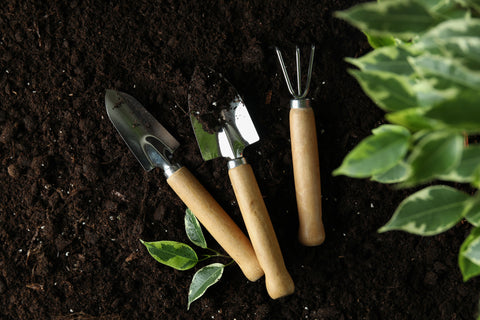
Azui is one of the most traditional brands on this list. A small blacksmith located in Miki, Hyogo - a town renowned for its blacksmithing industry, particularly when it comes to gardening and agricultural tools. They’re dedicated to using traditional methods and high-quality iron to make durable tools designed to last for decades.
If you're looking for a quality, handmade iron hoe, pick, or mattock then Azui is the brand for you. They make narrow-bladed hoes, cultivation hoes, and garden hoes with durable wooden handles designed to be used not just in large fields, but in small home and communal gardens too. Their pick mattocks make breaking up rocks, weeds, and clumps of dirt a breeze, as the super-strong hand-forged iron breaks through anything you can throw at it.
In addition, Azui makes a range of camping and outdoor goods under their sub-brand Millio. Millio’s woks, pans and other cookware are handmade in the most traditional ways. They forgo the pneumatic hammer, and forge each piece using an anvil, a hammer, and their own two hands. These authentic, hand-made Japanese iron pans are like nothing you’ve seen before. A throwback to an era of blacksmithing long-since abandoned.
Chikamasa
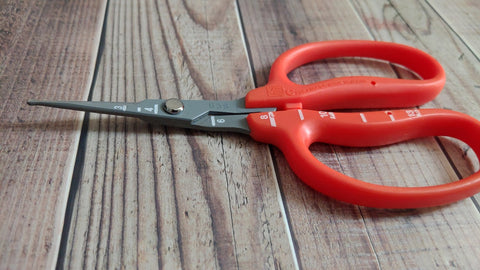
Chikamasa stands out among many of the brands on this list, as they don’t restrict themselves to hand-making their tools using only traditional processes. Even though they were founded more than 100 years ago, producing traditional scissors for Japanese ikebana flower arranging, they’re come to embrace many modern manufacturing methods.
By using industrial robots to complete most of the processes, they can ensure that all of their products will continue to be made in Japan, and not be outsourced to countries where manufacturing is cheaper. They also ensure that each pair of Chikamasa scissors or shears is created to the same standard as the last, with no deviation from pair to pair.
They produce dozens of different types of scissors, from garden shears, to flower arranging scissors, harvesting and thinning scissors, and tools for art & craft. They continue to make all of their products in Japan to Japanese standards of quality, and at least 90% of their manufacturing processes are completed in-house in their factories in southern Osaka.
Doukan
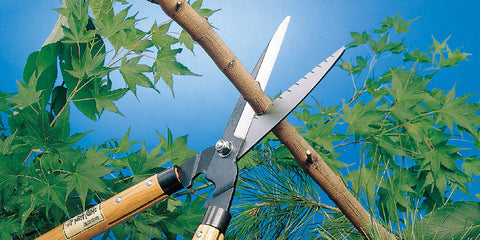
Doukan is a gardening and agricultural tool blacksmith from Miki, Japan. Miki is famed for its agricultural and horticultural tool industry, with many of Japan's leading brands established there. Doukan follows traditional methods when constructing their tools, many of which are hand-made and not mass-produced.
They first forge the steel by heating it to 800 degrees, and use a forging press to shape the piece into the desired form. For blades, the steel is then ground with a grinding stone, rough polished with a whetstone, and finished with a buffer. This is the most important process for Doukan, as this determines the sharpness of the blade. Finally, the pieces are assembled, each blade is checked one-by-one, and in the case of scissors and shears, the joint is hammered gently to ensure the perfect gap between both blades. Finally, the screws and bolts are tightened by hand, and each product is checked by the eyes and senses of an experienced craftsman.
Doukan makes kiridashi carving knives, weeding sickles, harvesting sickles, hoes, grass shears, hedge shears and harvesting knives out of quality Japanese stainless, carbon, and high-carbon stainless steels. Their tools are intended to be used by farmers, professional horticulturalists, and hobbyists alike, as they’re user-friendly, innovative, and very well-made.
Kanenori
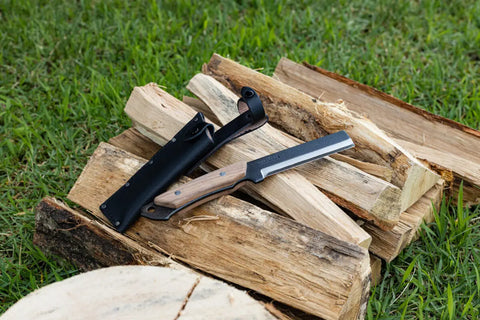
Kanenori was founded in Niigata, Japan, in 1943. Niigata’s Tsubamesanjo region has long been known for its blacksmithing industry, an industry made up of dozens of small workshops producing well-made cutlery out of steel.
Kanenori started their business as a polishing company, servicing the many manufacturing and blacksmithing companies in the region, but expanded into manufacturing themselves just a few years later. Now they’ve become one of the largest Japanese gardening tool brands, a company that specializes in shears and hatchets.
Kanenori's Pruman range of shears and clippers are popular options, sold across Japan in gardening and home centers. But their Japanese nata hatchets, which are typically handmade out of world-class materials, are special. Using dyed oak for the handles, brass for the bolster, and high-carbon Japanese steel for the blade - Kanenori's nata are very well-made tools that, if cared for properly, will last a lifetime.
Negishi

Negishi was founded around 80 years ago as a general gardening tool maker, but just 20 years later they pivoted, and began specializing entirely in watering cans. The company has remained in the same family since their founding in the 1940s, and the descendants of the founder carefully make each watering can by hand in Tokyo.
Negishi watering cans are the gold-standard for bonsai enthusiasts, simply no other watering device will compare. Negishi cans are not only used by master bonsai artist Kunio Kobayashi, but also the Bonsai Museum in Tokyo, and even His Majesty the Emperor of Japan.
They don't only make watering cans for bonsai, however, as they also have a range of European-style watering cans for outdoor gardening. Their precisely-crafted watering cans ensure exceptional water control with an even and sustained flow. Their copper and brass construction lends its antimicrobial properties, preventing harmful bacteria from growing inside the can and infecting your delicate plant life.
Okatsune
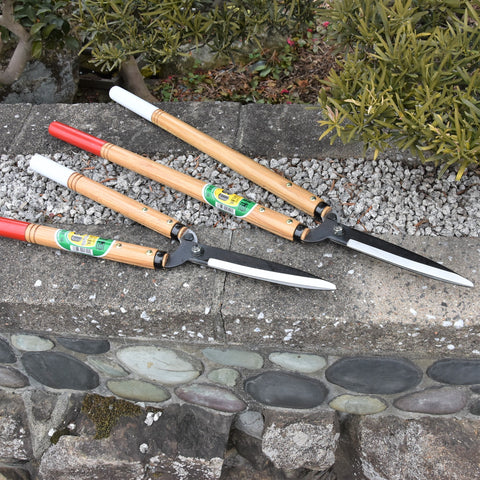
Tsuneichi Okano began training as a blacksmith apprentice in Hiroshima in 1925. After developing his craft to a high level, he opened his own blacksmithing workshop in the 1940s: Okatsune.
Initially, Okatsune produced small batches of expertly hand-crafted pruning shears, produced using completely traditional methods. As their products became well-known across Japan for the sharpness of their blades and the quality of their construction, the company expanded its product range and availability, with the goal of perfection always at the forefront.
Today Okatsune produces Japanese pruning shears, harvesting shears, hedge shears, bonsai scissors and more to avid gardeners all across the world. Their blades are forged using Japan's famous Izumo Yasugi steel, which is created using charcoal and Izumo iron sand with traditional techniques. Okatsune forges this steel into blades with very high hardness (60-61 Rockwell), ensuring that they will stay sharp for a long time, and always give a clean cut.
Silky
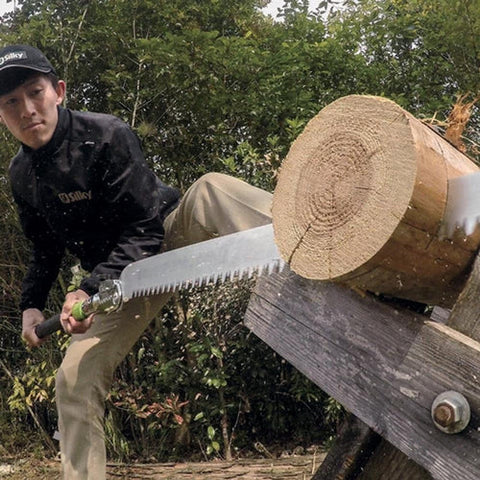
Silky is one of the most recognizable gardening tool brands worldwide. Since their founding over 100 years ago, they’ve dedicated themselves to developing innovative tools that are both multi-functional and easy to use. They burst onto the global stage in 1985 with their Gomtaro and Gomboy pruning saws, revolutionizing the pruning business by using a sturdy rubber for the handle. Now, the Silky Gomboy is one of the most popular pruning saws worldwide.
They also produce a wide range of axes and hatches, like the Silky Nata, which is a Japanese style of hatchet that has been growing in popularity recently. The Silky Nata is one of our most popular products at Daitool, and one of the best nata tools for beginners as it’s easy to care for, easy to use, and very durable.
Whether you’re a professional horticulturist or a gardening hobbyist, when you buy a Silky tool you can be confident that you’re buying a quality, user-friendly product that will last for years to come.
Suehiro Toishi
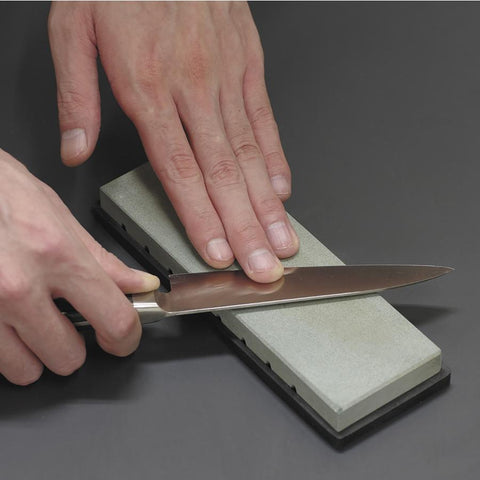
Suehiro Toishi doesn’t make gardening tools, but they do make tools essential for caring for your important gardening tools: whetstones. They’ve been making a wide variety of whetstones for over 60 years under their popular Suehiro, Cerax and Gokumyo brands.
What makes Suehiro special, however, is that they don’t only make whetstones designed for kitchen knives - like most Japanese whetstone makers - they make specialist whetstones for a wide range of applications. They make stones for sharpening sickles, chisels, pruning shears and more. So if you’ve taken the time to research, and put up the money to invest in a quality, handmade Japanese gardening tool, you should certainly consider getting a good whetstone to keep it razor sharp for decades to come.
Suehiro’s artificial whetstones are less likely to break than natural whetstones, and have a very high grit purity, so that your blade won’t get scratched during the sharpening process. In addition, since Suehiro Toishi’s whetstones use only a small amount of bonding material, they require far less soaking time than most, so you can pick one up and start using it within just a few minutes.
Tajima
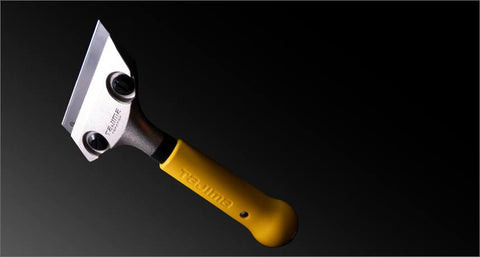
Tajima Tool is Japan's largest manufacturer of hand tools. They were founded in 1909, and at the time they could only produce a small range of tools, but now they make tools for the entire construction industry: electrical, safety, woodworking, metalworking, landscaping, and more.
If you looked through a Tajima catalog you’d find tape measures, spirit levels, laser rangefinders, rulers, scales, safety glasses, ropes & harnesses, workwear, flashlights, knives, wire strippers, scrapers, tool belts, drill bits, sockets, saw blades, grinding wheels, hand saws, scissors, caulking guns, planes, files, saw guides, plumb bobs, marking tools, pens, pencils, stud finders and a whole lot more!
Their range is so enormous that they’re the number one brand in most categories of tools in Japan. When it comes to gardening tools, though they have a lot of fierce competition, their products are just as impressive as their range. Their G-SAW in particular is a very popular, compact, folding pruning saw. Its all-black design makes it really stand out aesthetically, and its fluorine-coated blade means it can cut through even the greenest wood without seizing or excess sap buildup.
Tobisho
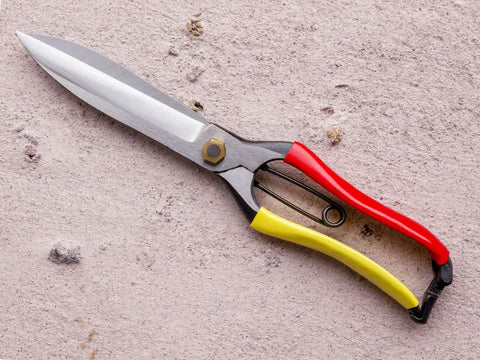
Tobisho is a traditional Japanese blacksmith based in Yamagata in northern Japan, an area historically famous for samurai sword production and bladesmithing. Their goal is to forge the highest quality pruning shears, garden scissors and garden clippers on the market, and that’s a goal that many of their customers believe they have reached.
Tobisho's Japanese pruning shears and scissors are clearly among the best in the world, with over 200 individual processes going into producing each pair. The blades are expertly ground, tempered, sharpened and finished by hand by blacksmiths with decades of experience. Then, each pair is polished, adjusted and tightened one-by-one to ensure a perfect cut, right out of the box.
If you’re looking for the best Japanese pruning shears, you really can’t beat Tobisho. Tobisho’s bypass pruners are unbelievably sharp, in part due to the world-class materials used, like yasugi aogami blue paper steel and others. In addition, they continue to employ many traditional processes in their manufacturing, carrying on Yamagata’s bladesmithing tradition in every pair of shears.
Tomita Nisaku
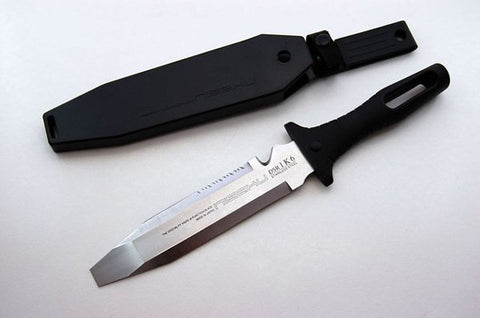
Tomita Nisaku is a family business from the Tsubame region of Niigata prefecture. Founded in 1952, the company is still run by the children of its founder. With a total of only 16 employees, this small, family-owned and operated blacksmithing business produces a surprising variety of gardening tools. From Japanese nata tools, including nata hatchets specifically designed for splitting bamboo, to Hori Hori knives for general garden digging and cutting, to transplanting tools, and even agricultural tools like sickles.
Their Hori Hori knives in particular have become very popular recently. These Japanese garden knives are a cross between a weeding knife and a root knife, with a lot of other great features. With its curved blade and serrated edge, it can easily pierce compacted soil, cut through tough root systems, and slide around the inside of plant pots for transplanting. In addition, they typically have measurements etched into the blade, so you can see your cutting depth at a glance.
Toyama Hamono
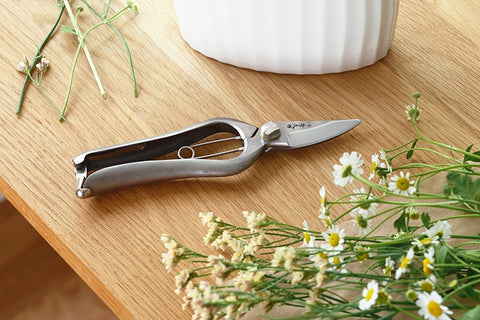
Toyama Hamono was founded in the Bunkyu era of the Edo period, making them one of the oldest companies on our list. Even after all this time, the company is still run by the same family, in the same town as when they were founded. Toyama Hamono are known as manufacturers of gardening tools at a standard of quality much higher than you could expect, and thanks to this, their products frequently win prestigious awards.
Over the past 20 years, they've won the IDS Design Award and the Good Design Award three times each, they've won awards at the Design Tokyo exhibition and the Melbourne International Flower & Garden Show, they've been invited to participate at the Frankfurt International Trade Fair, the Chelsea Flower Show, and the Doha International Horticultural Expo, they've presented their shears to Her Royal Highness Princess Sirindhorn of Thailand - an avid gardener - and been recognized by the Japanese government as an Outstanding Local Product.
Toyama Hamono’s blacksmithing methods are based on the manufacturing methods of Katana (Japanese samurai swords) and they have been hand-making secateurs and shears for almost 160 years. Their special techniques have been passed down through generations, and they enjoy a reputation throughout Japan and the world for producing excellent gardening and bonsai tools that can be used regularly for a very long time.
Trusco
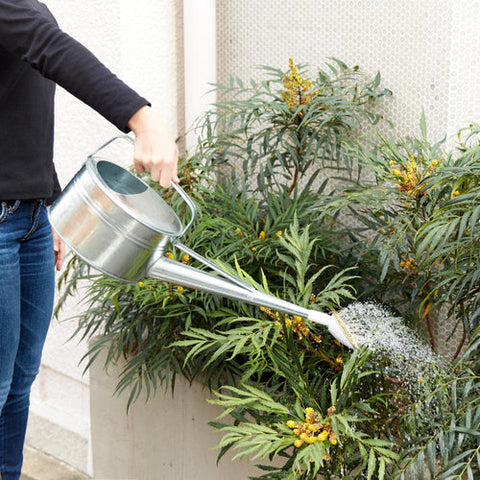
Trusco is a very well-known brand across Japan, not just because of their range of quality tools, but also because of their distribution network. They began selling tools from other Japanese companies in the 1950s through a nationwide catalog called Orange Book. Eventually, they became one of the first Japanese companies to venture onto the web, when they took their Orange Book online - it’s now Japan’s largest ecommerce site for tools.
Now they’re a trusted and recognized brand across Japan. They are known to be kind to their employees, charitable, and reliable. In addition to selling tools from other companies, they have a range under their own brand. Trusco tools are known to be of a high quality, and to fill gaps in the market that other companies have neglected.
One of the most popular products on Daitool is the Trusco galvanized steel watering can. This watering can comes in two sizes, 4 liters and 6 liters, and was designed not only to be a strong, durable, corrosion-resistant watering can with a classic design that can take a beating, but to have a gentle, even water flow thanks to its brass, "lotus seed" spout.
So now that you have a fairly comprehensive knowledge of Japan’s major gardening brands you can start putting together your wishlist of gardening tools to help you through the spring and summer growing season!

0 comments